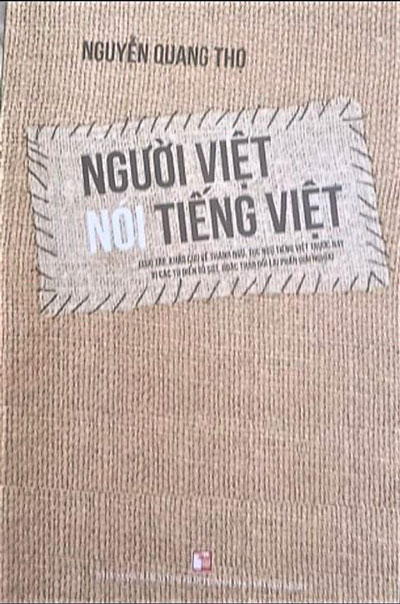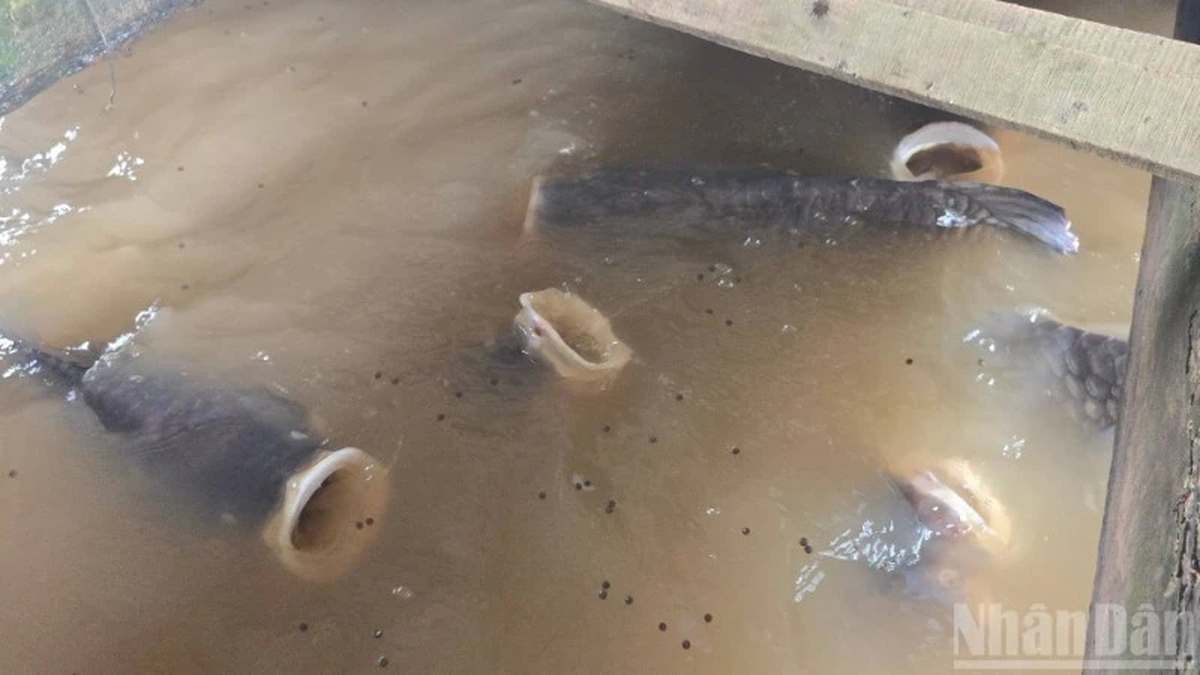In my opinion, Vietnamese is still the most "difficult" language. Even though Vietnamese people speak Vietnamese, were born in Vietnam, from the way of thinking to the perspective of cultural aesthetics... all are viewed from the perspective of Vietnamese people, but then there is an extremely interesting and ironic thing that there are words/phrases that even though we still write, still speak... but do we really understand them thoroughly and thoughtfully?
Snail water is not as bland as we think...
Once I say this, there will surely be people who will smile or smirk, thinking that I am deliberately "exaggerating" the problem. However, I will not argue with this, because I am a person who is self-studying Vietnamese, so I do not dare to "show off my skills". If anyone wants to argue with the above point of view, perhaps the best way is to read the book "Vietnamese people speak Vietnamese" (Ho Chi Minh City General Publishing House - 2023).

Cover of the book "Vietnamese people speak Vietnamese".
This is a book that, in my opinion, when you hold it in your hand, you can see that the author wants to "pick a quarrel", "cause trouble", "cause trouble" with anyone who thinks he understands Vietnamese. On the cover of the book, right under the title, there is a line printed that speaks bluntly, without beating around the bush, without beating around the bush: "Collection and research on idioms and proverbs that dictionaries have missed or exchanged for their explanations". At first reading, those who think they understand Vietnamese to the level of a "king of Vietnamese" will surely feel that those lines are a bit "arrogant"?
Because since the national language was invented, many researchers have collected the words of our ancestors. These books are quite numerous, and over the years they are still being added to... So when we say "the dictionaries have missed out", it sounds absurd, "like a tadpole's tail is cut off"? It's even more absurd when the author also wants to discuss the explanations in those dictionaries. For a long time, people have always trusted dictionaries, using them as the standard when they want to learn a word, right? So is it possible that the dictionaries' explanations are not correct?
First of all, may I ask who is the author of this book and how dare he be so "daring"?
I would like to say that this is journalist Nguyen Quang Tho, born in 1949 in Nam Dinh , grew up in Hanoi. From 1968 to 1971, he joined the army, was a soldier of Division 304. Graduated from German literature at Karl Marx University, Leipzig - German Democratic Republic in 1979. Graduated from master's degree with the topic "Comparative idioms of German (compared with Vietnamese)" at the University of Social Sciences and Humanities, Ho Chi Minh City in 2004. He was an editor of Thanh Nien Publishing House, Editor-in-Chief of Culture and Life Magazine (Ho Chi Minh City General Publishing House, 1991-1992), Editor-in-Chief of Yeu Tre Newspaper (1991-1992). He currently lives in Ho Chi Minh City.
The reason I have to clearly state the author's "background" is because we are discussing a serious story here - especially about Vietnamese, so everything needs to be clear about the identity, not hiding under some random name.
When I asked why he wrote this book, Mr. Tho said: "The vocabulary of a nation is extremely large, no one knows it all. If you want to know a lot, you have to learn a lot. Learn from the cradle to the grave. Every day of life is a day of fieldwork." So what is Mr. Tho's "inner strength"?
With over 600 idioms and proverbs appearing in this book, I would like to choose randomly, he wrote: "The Vietnamese Idiom Dictionary has collected the idiom "Nhat nhu nuoc oc". Bun oc has always been a favorite dish of many people, including my wife. Until now, I still remember the bowl of cold rice that my brothers and sisters often ate in the morning, with two dimes of snail water from our neighbor. The water was shimmering the color of a flower garden, with a bit of fat, tingling the tip of the tongue, making the rice "slide into the stomach before it even touches the lips". Snail water is not as bland as people think... The correct idiom should be "Nhat nhu nuoc oc ao beo". In ponds full of duckweed, duckweed eats all the nutrients. How can skinny snails have sweet water? My country people say "Nhat nhu nuoc oc ao beo"; I believe that they are the fairest judges in the world" (p. 19).
Just because I love Vietnamese so much
With a narrative style based on reality, the author titled chapter 1: "Seeing with my own eyes, hearing with my own ears". With what he had heard and seen, Mr. Tho recounted a specific story to clarify certain idioms and proverbs. Here, I was interested in the life experience he had and had acquired, thanks to which, the story was expanded beyond being confined to "books". I was surprised by the many "strange" phrases that appeared in this book, Mr. Tho said that he learned most of them from his mother - a hard-working, diligent Northern farmer.
In chapter 2: "Talking about it, just telling the truth", in my opinion, this is still a chapter that brings back a lot of thoughts, because he "told the truth" and needed to discuss the definitions in many dictionaries. For example, he wrote: "Nguyen Duc Duong's dictionary of proverbs includes the proverb "Qua cho con tien, vo duyen khoi mat ma" and records "not clear meaning"... I think it should be written as "no meaning", because this sentence is wrong, not true to the original. The obvious mistake is the parallel clause. If you pay attention, you will immediately see that the second clause has an extra word and that is definitely "khoi". In terms of meaning, we see that after going to the market, there is nothing more to buy, there is still money in the pocket. Without fate, no one to caress, kiss, the cheeks are still "virgin", still smooth. If it is correct as I often hear, this proverb is "qua cho con tien, vo duyen khoi mat ma" (p.176). In chapter 3: "Beat the drum through the thunder house door", Mr. Tho said: "Hopefully the notes in this chapter contribute to answering the question: What is an idiom?".
The significance of the book "Vietnamese speaking Vietnamese", in my opinion, is also the boldness and confidence of a Vietnamese scientist who, because he loves Vietnamese so much, expressed his thoughts. Right or wrong, redundant or lacking, is still a matter of discussion, but it must be admitted that the vocabulary that Mr. Nguyen Quang Tho used in the book is extremely rich and diverse. In general, after reading it, many people will want to... argue back, just as Mr. Tho "argued" with many dictionaries. This is completely normal and healthy, and is necessary in debate - especially when we are looking for the words and speech of Vietnamese people. If so, it will not only bring joy to Mr. Tho personally but also to us, because in this day and age, Vietnamese is always, still in the interest of everyone.
At 8:30 a.m. on July 1, there will be an exchange program and introduction of the book "Vietnamese speaking Vietnamese" (Ho Chi Minh City General Publishing House - 2023) by author Nguyen Quang Tho with guest linguist Dang Ngoc Le at Ho Chi Minh City Book Street.
Source




























![[Photo] National Assembly Chairman Tran Thanh Man visits Vietnamese Heroic Mother Ta Thi Tran](https://vphoto.vietnam.vn/thumb/1200x675/vietnam/resource/IMAGE/2025/7/20/765c0bd057dd44ad83ab89fe0255b783)







































































Comment (0)